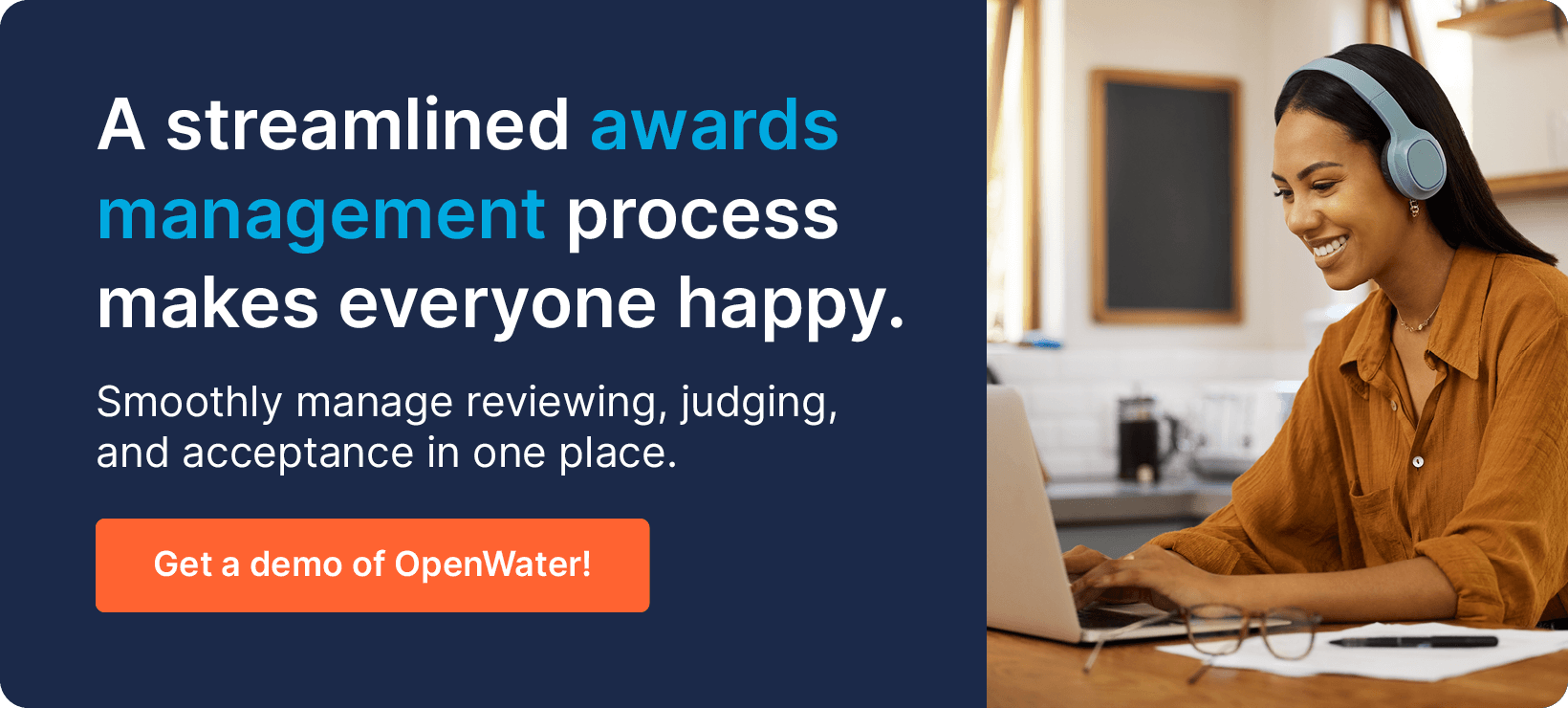
What Is Awards Management? Everything You Need to Know
For associations, higher education institutions, and other organizations, award programs support innovation, drive academic success, and foster community impact. However, managing these awards can quickly become complex and time-consuming.
Awards management has many moving parts, including promoting opportunities, tracking applications, reviewing submissions, and more. It can be stressful to balance everything, especially when you’re new to the process.
To help you get started, we’ll explore the basics, best practices, and tools that can help modernize your awards management processes. Here is what we’ll cover:
- Awards Management FAQ
- Essential Elements of Awards Management
- How Software Can Streamline Awards Management
Whether you’re handling some scholarships or overseeing a large portfolio of grants, you’ll learn how to reduce administrative burden, enhance the applicant experience, and ensure that your awards make an impact.
Awards Management FAQ
We know that managing grants and scholarships can get complex, and naturally, questions come up. Below, we’ve answered some of the most common questions about awards management.
What is awards management?
Awards management refers to the process of administering and overseeing various types of awards for association and higher education community members. These awards often include recognition for outstanding achievers and occasionally monetary scholarships or grants that honor excellence in academic, professional, and community contributions.
It involves various stages, from application intake and review to disbursement and reporting. The goal is to recognize the right people efficiently and track funding properly if a monetary award is attached.
Why is award management important?
Effective awards management helps your organization maximize impact, create a positive applicant experience, and maintain transparency.
By streamlining key processes, your team can focus more on outcomes and less on administration. Here is a rundown of the benefits of effectively managing awards:
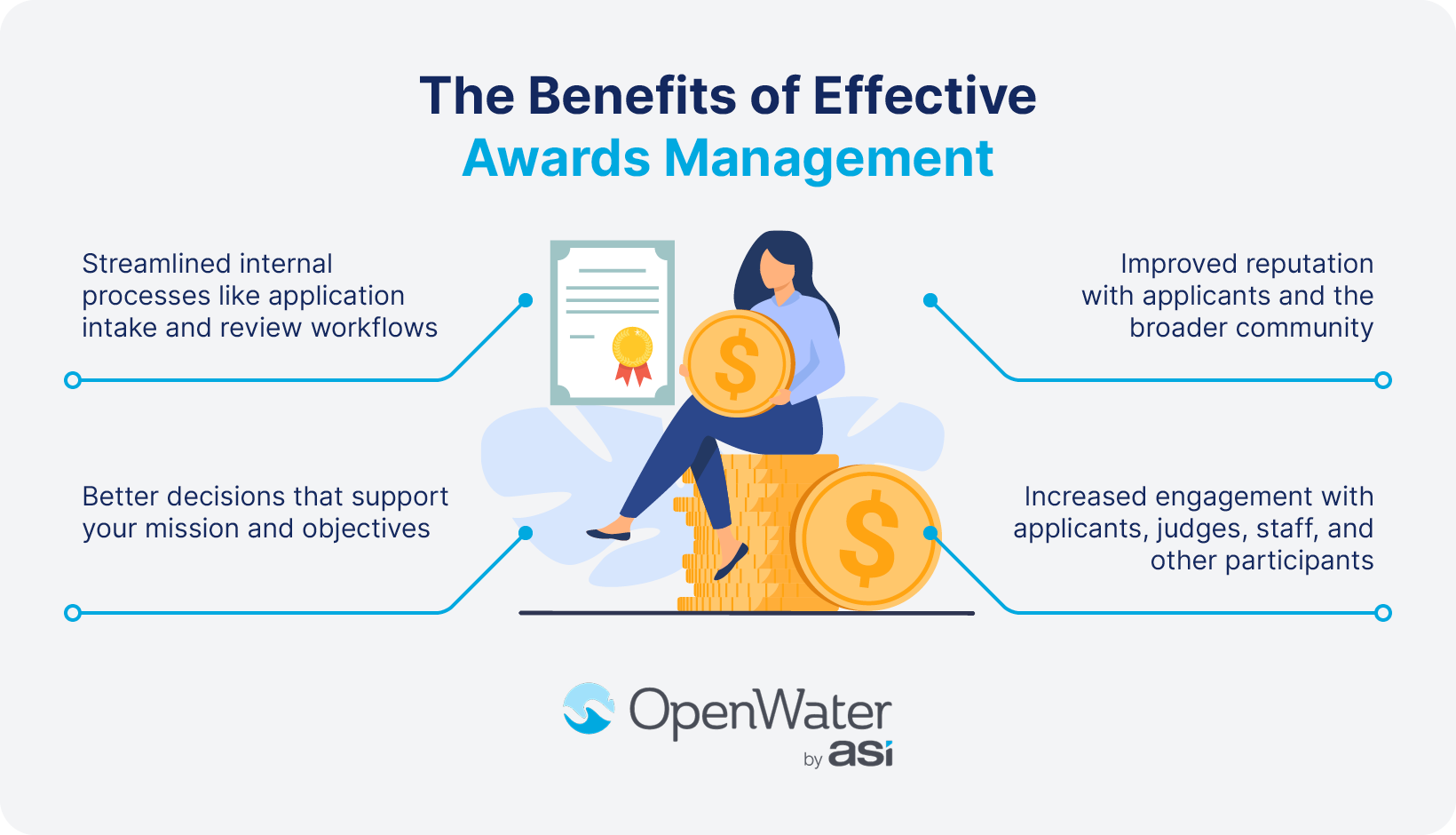
- Streamlined internal processes: Automate and simplify tasks like application intake, review workflows, and reporting to reduce administrative burden.
- Improved reputation: A transparent, fair, and efficient awards process fosters trust and credibility with applicants and the broader community.
- Better decisions: You can ensure that you support your organization’s mission and objectives by awarding deserving recipients.
- Increased engagement: Applicants, judges, staff, and anyone else who touches your awards program will have a more enjoyable experience since key processes will be organized and automated when possible.
When your awards process runs smoothly, everyone wins: your team, applicants, sponsors, and entire community. It’s all about making it easier to make a greater impact.
Who is involved in awards management?
Awards management is a collaborative effort that involves several essential roles, each playing an important part in ensuring the process runs smoothly and effectively. When designing your awards program, you might assign or encounter these key groups:
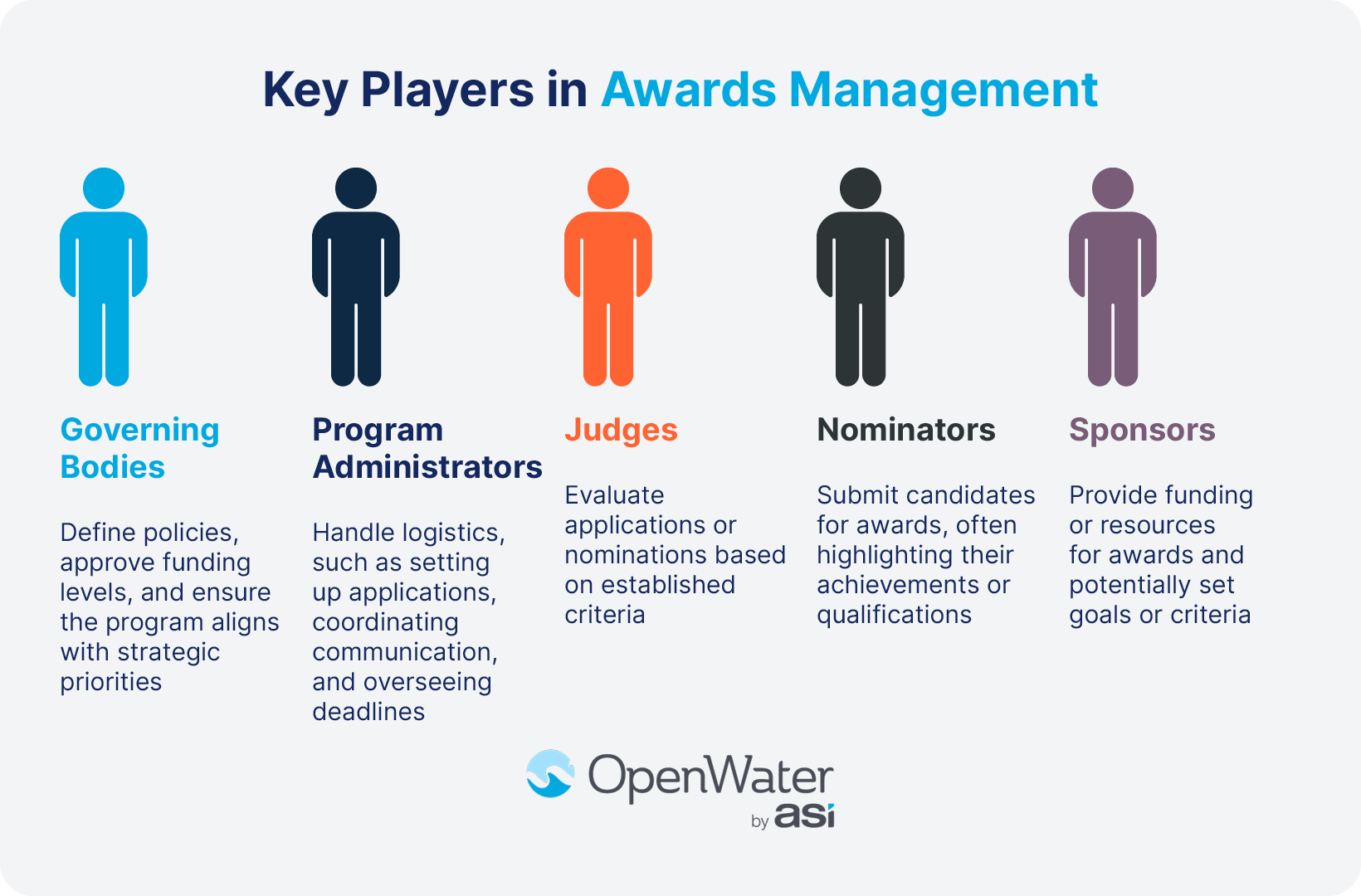
- Governing bodies of an organization (like boards or leadership committees) set the big-picture direction for the awards program. They define policies, approve funding levels (if applicable), and ensure the program aligns with the organization’s mission and strategic priorities.
- Program administrators manage the day-to-day execution of the awards process. They handle logistics throughout the entire awards process, such as setting up applications, coordinating communication, overseeing deadlines, and ensuring compliance with the policies the governing body sets.
- Judges evaluate applications or nominations based on established criteria, playing a critical role in selecting the most deserving recipients.
- Nominators submit candidates for awards, often highlighting the achievements or qualifications of other individuals who they think deserve the award.
- Sponsors provide funding or resources for awards. They may set specific goals or criteria for allocating the awards.
You’ll need to assign or recruit judges and program administrators based on expertise. Meanwhile, other roles, such as nominators and sponsors, will come from within your community or be selected based on specific needs. Regardless of how they’re filled, all roles work together to ensure the process is fair, transparent, and impactful.
Essential Elements of Awards Management
To effectively manage your awards program, you need to understand the core components of the process. Let’s take a closer look at the key components that contribute to a smooth and impactful awards experience.
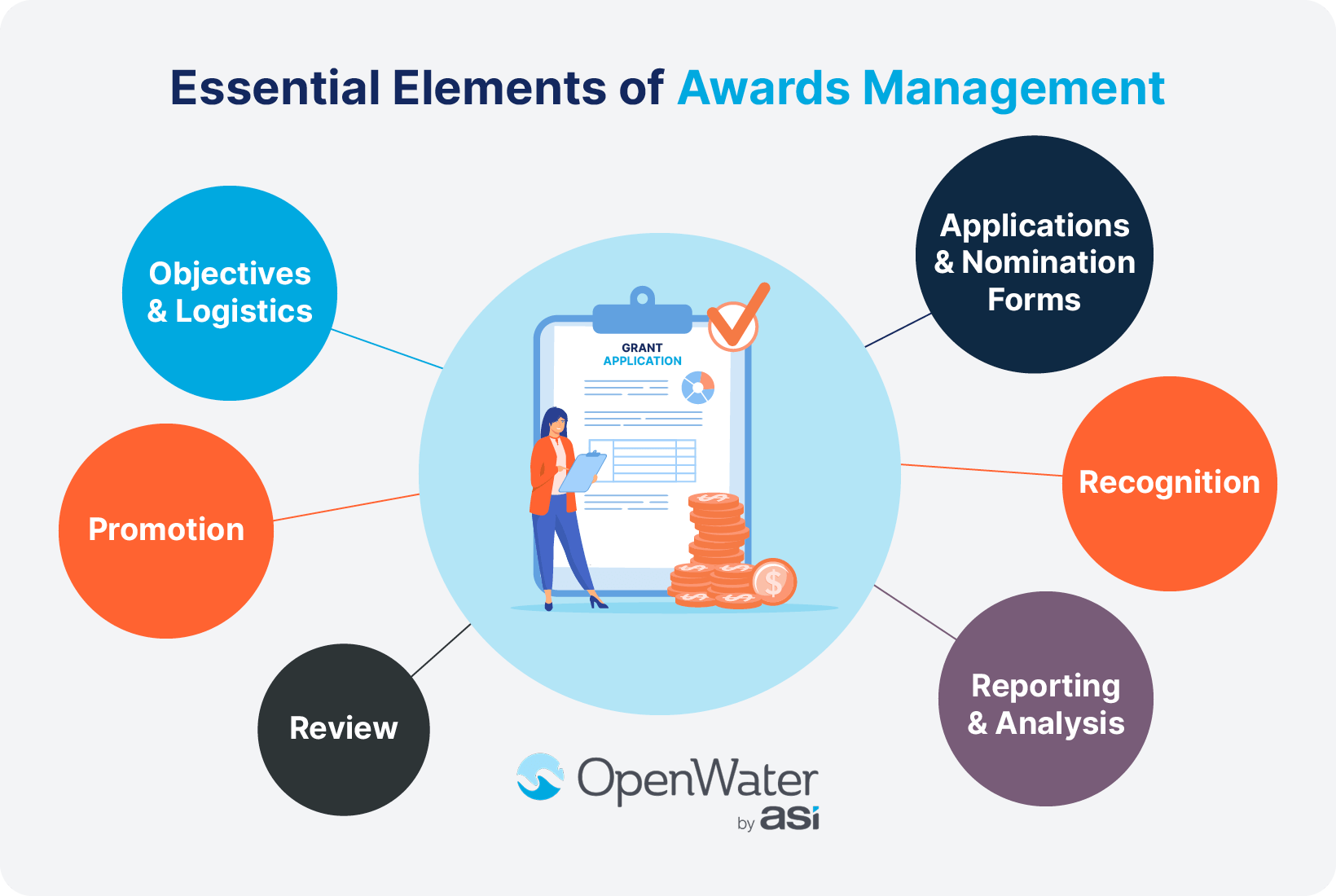
Objectives & Logistics
The first step in any successful awards program is clearly defining objectives and logistics. Your objectives set the tone for the program—are you recognizing outstanding achievement, fostering innovation, or supporting research efforts?
Once you’ve established your goals, organize program logistics by doing the following:
- Set a timeline for the opening and closing of applications, deadlines for nominations, judging periods, and the announcement of awardees. A clear timeline keeps everything on track.
- Decide on eligibility criteria for those who can apply or be nominated. Are there specific academic achievements, professional qualifications, or community involvement requirements? Clear eligibility criteria ensure that only qualified candidates are considered.
- Determine award categories, whether by field of achievement, type of contribution, or another relevant factor. Clearly defined categories help applicants understand where they fit and ensure fairness across various groups.
- Establish the process for submitting an application or nomination, including required documentation, deadlines, and submission channels. A well-defined process ensures that all necessary information is provided in recognition award and grant applications.
Thoughtfully planning these components creates a strong foundation for your awards program. With these elements in place, you can create an organized experience for applicants and your awards management team.
Promotion
Effective promotion gets your program in front of the right candidates. You’ll want to take a multi-channel marketing approach, focusing on email campaigns, social media, and direct outreach to target groups. You should also create a landing page or microsite for your awards program to centralize important information, then link to this resource in other communications.
Wherever you promote your awards program, include key information such as:
- Eligibility requirements: Clearly state who can apply or be nominated, including any specific qualifications or criteria.
- Award categories: Highlight the different awards available and what each recognizes.
- Application deadlines: Provide clear dates for submission and ensure applicants know when they’ll hear back about your decision.
- Submission process: Outline the steps applicants need to take and what materials they must submit.
- Contact information: Offer support for any questions or assistance throughout the process.
Clear communication is key to attracting high-quality applicants. Marketing the essential details through the right channels will motivate them to apply.
Applications & Nomination Forms
When designing your application or nomination forms, it’s important to include key details that will help applicants submit complete, mistake-free entries. Be sure to specify the eligibility criteria for each category and outline any submission rules, such as document formatting or word count limits. Additionally, clearly state what information is required, including personal details, achievements, and any supporting materials like letters of recommendation or portfolios.
By keeping your forms clear and comprehensive, you’ll create a smoother application and review process.
Review
As you might expect, during the review process, judges assess applications or nominations to select the most deserving recipients. Judges typically evaluate submissions based on predefined criteria, such as achievements, qualifications, impact, or innovation, depending on the goals of the award.
It’s important to provide judges with clear guidelines on how to score or rank applicants to ensure consistency and fairness. You might have your program administrator or governing body develop a rubric for judges to follow.
Beyond exercising fairness, evaluation criteria make comparing candidates across different categories easier. For example, let’s say your awards program has different categories like academic excellence, community service, or research innovation. Clear criteria help judges evaluate each applicant based on what’s most important for that specific category, rather than just making broad comparisons.
Recognition
Post-award, you’ll want to recognize winners to celebrate their achievements and reinforce the value of your program. You can show appreciation in several ways depending on the nature of the award and your organization’s resources.
Here are a few recognition ideas to spark your inspiration:
- Events: Host an awards breakfast, lunch, reception, or dinner to publicly acknowledge recipients. Your event might include a walk across the stage and short speeches.
- Plaques or certificates: Tangible recognition can be a lasting reminder of the recipient’s accomplishment and give them something to proudly display.
- Awards program website: Designate a section of your website for your awards program or create a new landing page for it. Then, list recent winners with their photos and a brief description of their winning project or accomplishment.
- Press releases: Acknowledge winners and promote your award program with a press release that highlights the winner’s story and the impact of their contribution or accomplishment.
How you recognize your award winners can make a big difference in celebrating their achievements and inspiring others to get involved. Choosing a memorable way to honor them helps create a culture of success within your community.
Reporting & Analysis
Reporting and analysis are essential for understanding the effectiveness of your awards program and ensuring any awarded funds are used properly. By tracking key data points, you can assess how well your program meets its goals, spot trends, and identify areas for improvement for future award cycles.
For awards that provide grant-type funding, accurate tracking is even more crucial. Monitoring funding allocations, expenditures, and outcomes helps demonstrate the tangible impact of the awards, ensuring that funds are spent efficiently and aligned with research objectives. Moreover, thorough reporting ensures compliance and fosters transparency, which builds trust with stakeholders and highlights the program’s overall effectiveness.
How Software Can Streamline Awards Management
As your organization grows, so will its awards programs. More applicants, more reviewers, more criteria, different categories—it will become a web of spreadsheets and emails if you don’t have the right tools.
OpenWater resolves the chaos of disparate spreadsheets, manual processes, and disjointed communication by providing a unified platform that streamlines every aspect of awards management. Backed by our all-in-one awards management software, you can streamline workflows and create an enjoyable applicant experience with features such as:
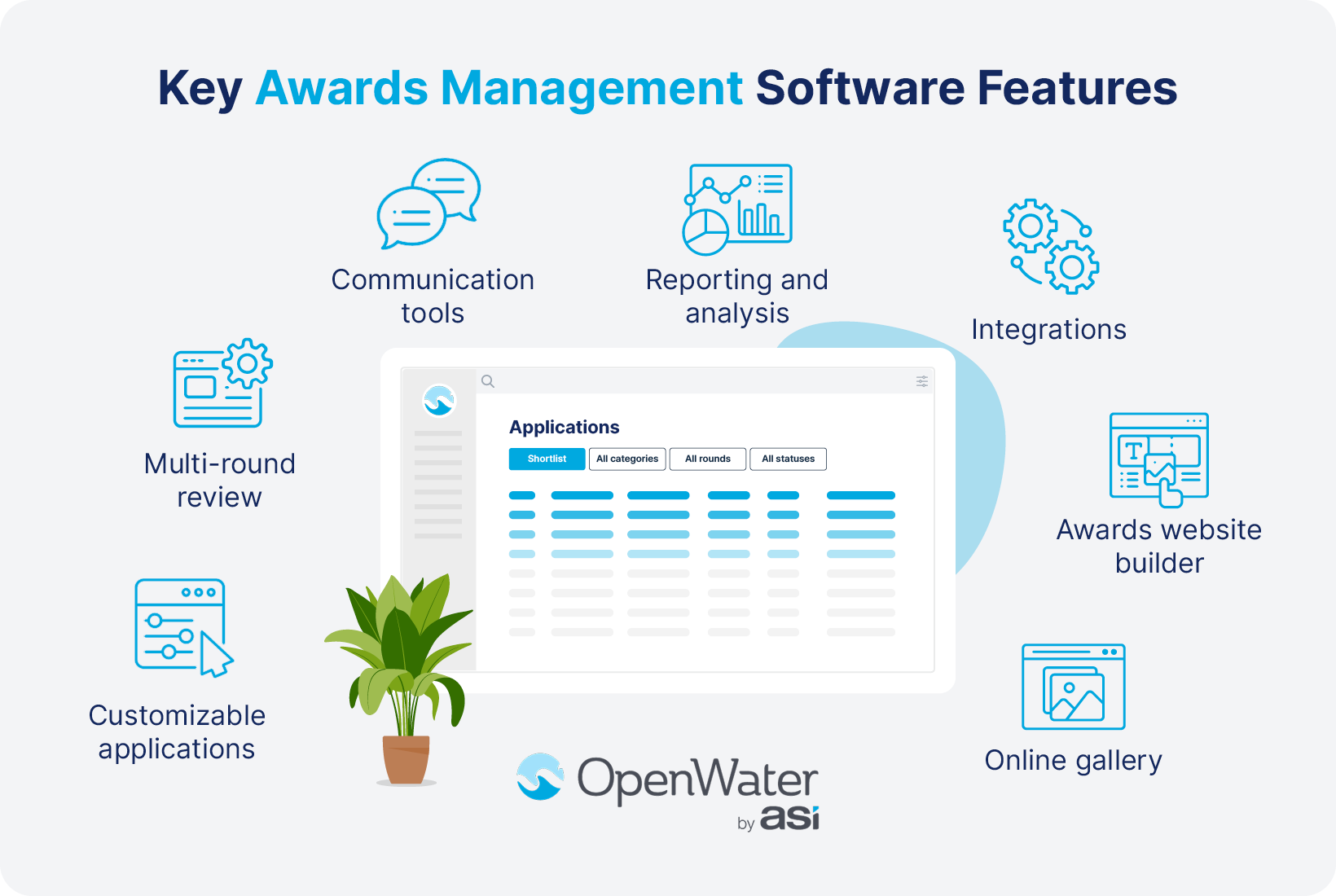
- No-coding-required awards website builder: Quickly build and launch a professional awards website without needing any programming knowledge.
- Customizable applications: Tailor your forms to suit your specific awards program, allowing you to collect the right information from applicants easily.
- Multi-round review capabilities: Simplify complex evaluations with the ability to conduct multiple review rounds in one platform, allowing judges to provide feedback, refine scores, and collaboratively narrow down selections before making final decisions.
- Communication tools: Stay connected with applicants, reviewers, and other stakeholders through built-in messaging, notifications, and alerts, ensuring smooth and timely communication.
- Online gallery: Showcase award winners in a searchable gallery on your website that automatically updates with each new win.
- Reporting & analysis: Access real-time data and generate detailed reports to evaluate your awards program’s success, monitor trends, and identify areas for improvement.
- Integrations: Easily connect OpenWater with other platforms and tools your organization uses, including many popular AMS and CRM solutions, so data will flow seamlessly across systems.
To learn more about these capabilities, check out this overview video that explains how our solution streamlines the awards management process:
With OpenWater, entrants, judges, administrators, and anyone else who encounters your awards program will experience an organized, branded process.
If you still aren’t convinced, here is a real-world example of our software in action: Since 2016, the American Society of Association Executives (ASAE) has used OpenWater to manage awards, fellowships, and grants. Our solution has helped them tackle issues like configuring complex judging rules and reducing tedious administrative workflows.
Wrapping Up: Additional Resources on Awards Management
Managing awards is an opportunity to recognize achievement, support innovation, and drive positive outcomes in your community. With the right systems and processes, you can streamline workflows, ensure fairness, and make a lasting impact.
As your organization’s awards programs grow, leveraging the right tools will empower you to handle increasing complexity. Embrace technology like OpenWater to transform your awards process from a disjointed series of manual steps into an efficient experience that benefits everyone involved.
To learn more about effective awards management, check out these resources:


